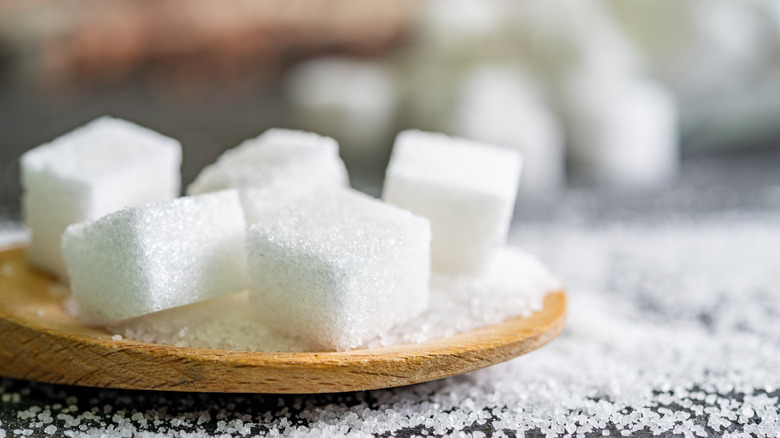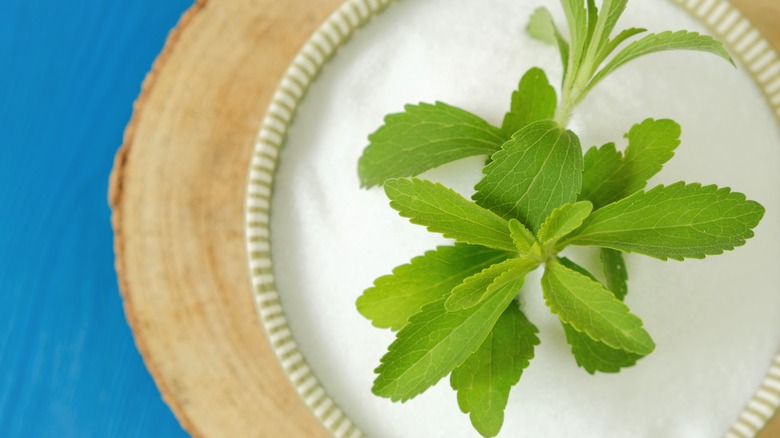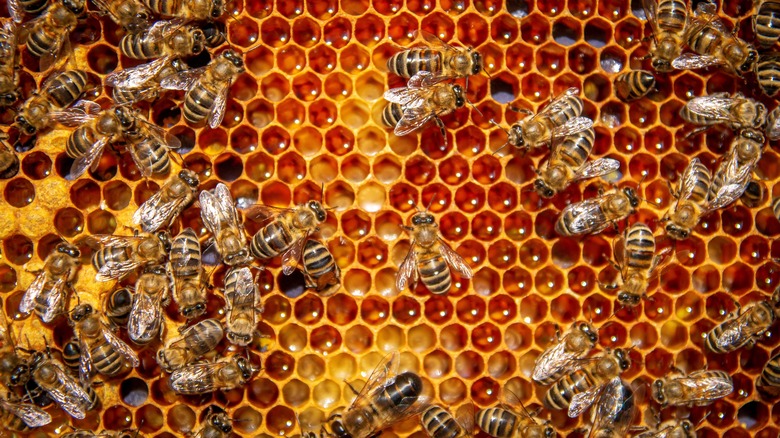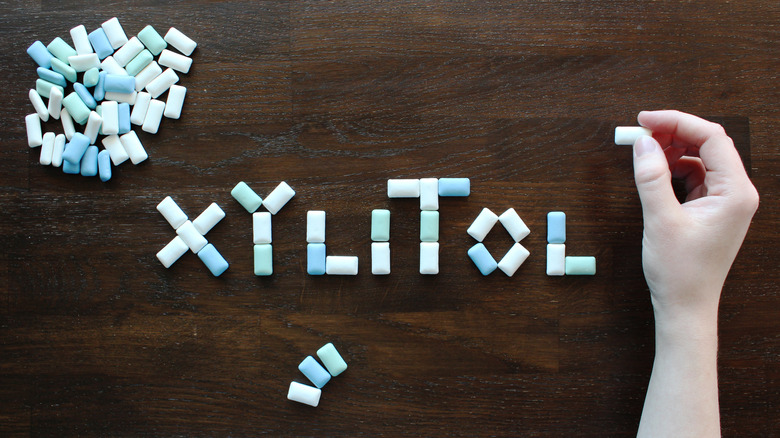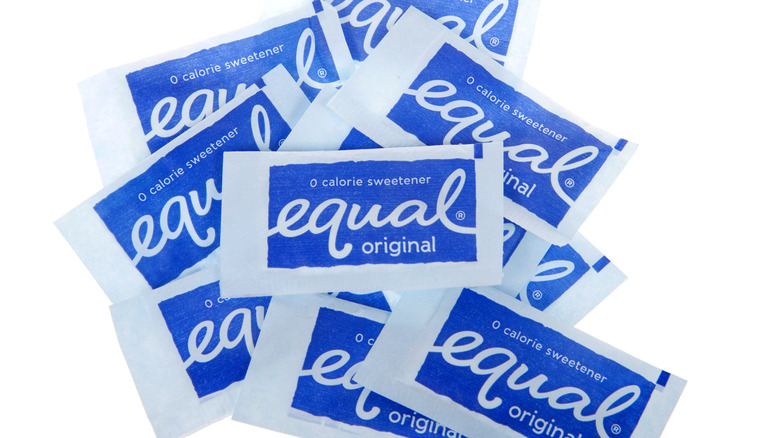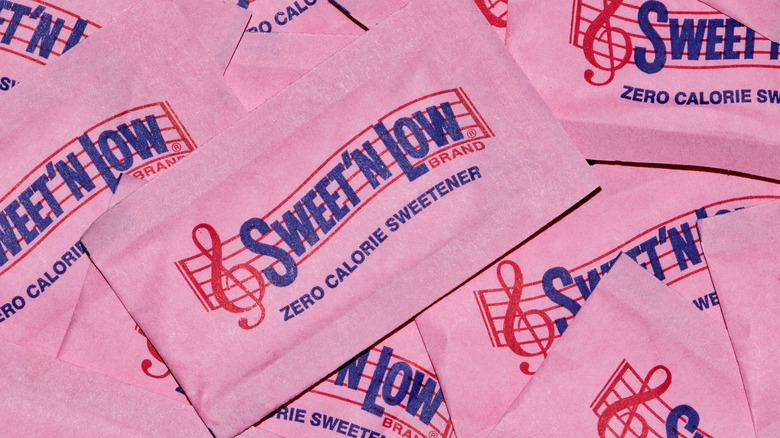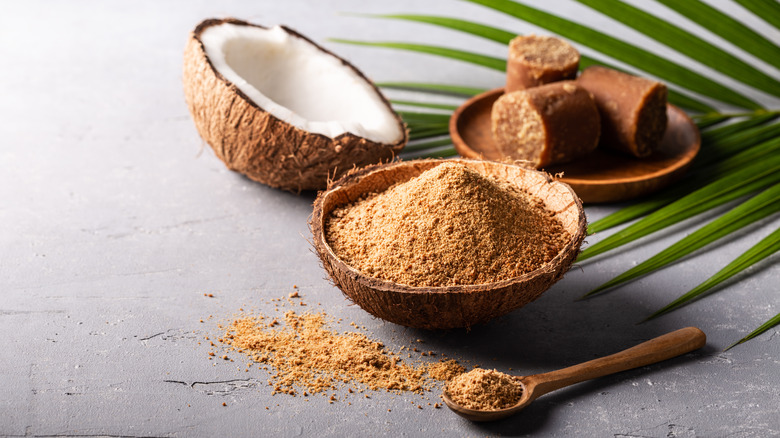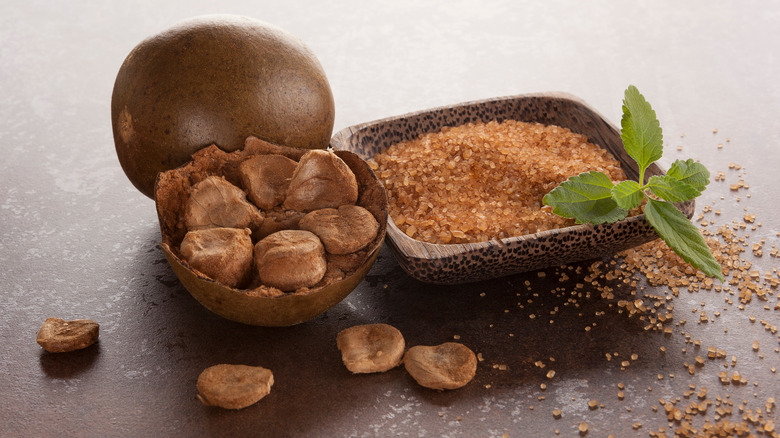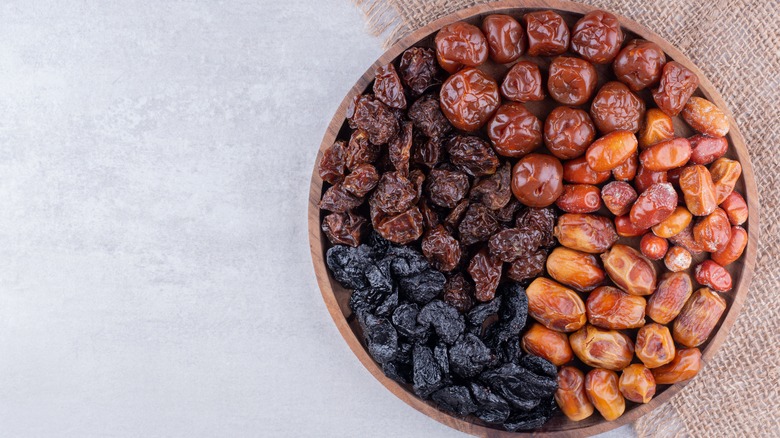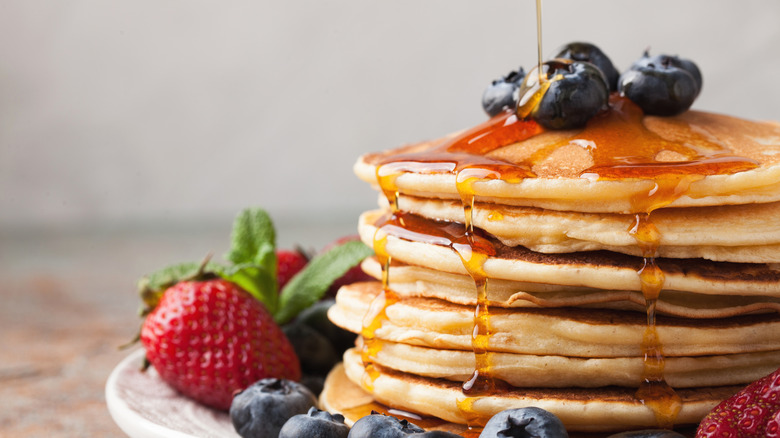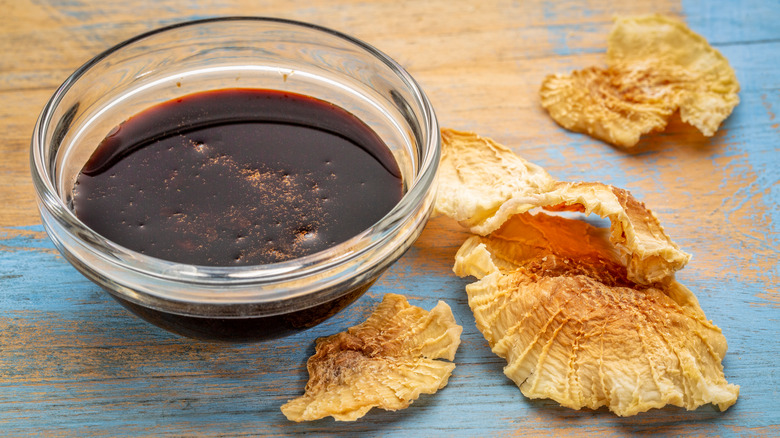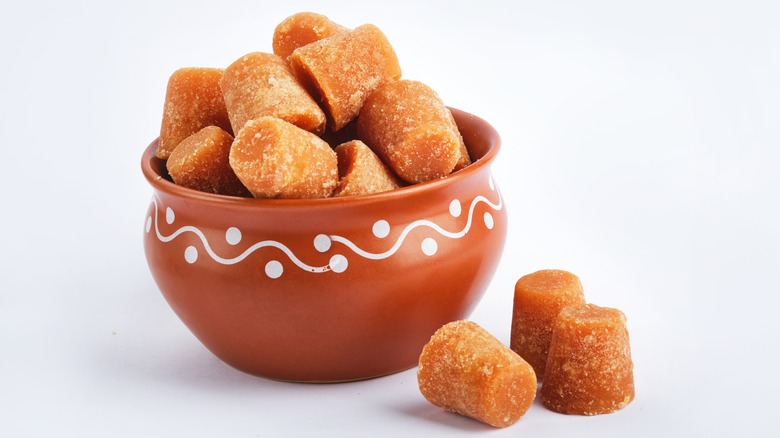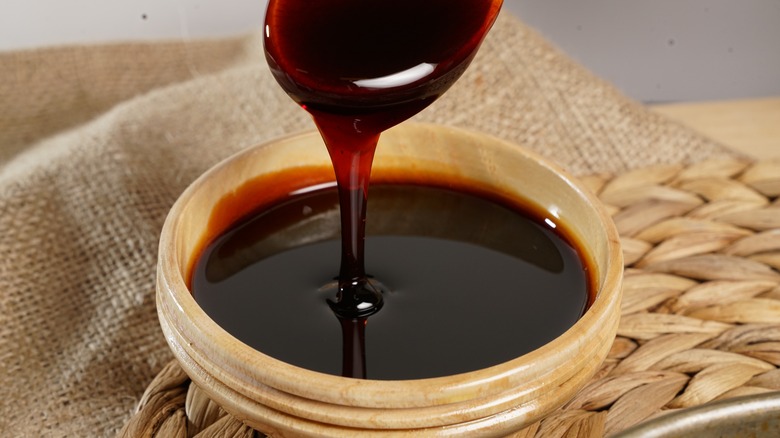The Ultimate Guide To Alternative Sweeteners
Sugar is bittersweet — it tastes so good, but it can also be harmful to your health. The American Heart Association recommends that adults limit their consumption of added sugars to about 25 grams per day for women and 36 grams for men. Unfortunately, the standard American diet contains considerably more sugar than the recommended daily intake. Added sugar is hiding in seemingly every processed food, from yogurt and cereal to burgers and soda, not to mention the more obvious sources, like cookies, cakes, and ice cream. Eating excess amounts of sugar have been linked to weight gain, diabetes, heart disease, depression, skin issues, and even cancer (per Healthline).
Sugar goes by many names: evaporated cane juice, fructose, high-fructose corn syrup, and maltose, among others. But it can also come in many forms, and the way your digestive system processes them and how they affect your body differ. For example, refined white sugar and fruit sugar are not the same — naturally occurring sugar in whole fruits contains fiber and other elements that slow down the digestive process so that your body doesn't experience the blood sugar spike that typically comes with refined sugars (via The University of Texas MD Anderson Cancer Center).
However, some alternative sweeteners, like honey and agave nectar, fall somewhere in between naturally occurring sugar and refined sugar. So how can you tell the difference? Let's explore some of the many alternative sweeteners out there and how they work.
Stevia
Stevia comes from the leaves of the stevia plant, which is in the same family as daisies and sunflowers. It's processed into a white powder or liquid that is commonly used as a sugar alternative due to its taste. In fact, the sweetness of stevia leaves is anywhere from 100 to 300 times greater than regular table sugar (via WebMD). It has become a popular sugar substitute for people with diabetes or those trying to limit their sugar intake because it contains almost zero calories and zero carbohydrates. Stevia does not actually contain sugar — the sweet taste is naturally occurring. According to Medical News Today, stevia does not affect blood glucose or insulin levels, and it may help mitigate weight gain and reduce the risk of pancreatic cancer.
When substituting sugar for stevia, it's not recommended to use the same amount of stevia as you typically would with sugar, due to the intensity of sweetness. One manufacturer, for example, states that a 3/4 cup of sugar is the equivalent of a half teaspoon of stevia powder. Plus, it can actually taste bitter in excess. Most packages have a sugar-to-stevia ratio on the label for recommended use.
Agave syrup
Agave syrup, sometimes mistakenly referred to as agave nectar, comes from the agave plant, which is a cactus-looking succulent — the same plant that tequila comes from. The leaves contain sap (nectar) that is harvested and processed into syrup. Unfortunately, the production method involves high heat, which eliminates most of the potential health benefits this plant has to offer (via Healthline).
Agave syrup may be touted as a healthy alternative to refined sugar, which is likely due to its low glycemic index. Foods with a lower glycemic index have little effect on your blood sugar levels, whereas foods with a higher number tend to cause more extreme blood sugar spikes. This means that agave could be helpful for those managing diabetes. But a lot of factors, from how a food is cooked to what other types of foods are included in a meal, can make it complicated to calculate the body's glycemic response (via Oregon State University).
However, agave syrup isn't necessarily in the health food category either. In fact, according to author and nutrition expert Nicole Avena, Ph.D., "Despite having a low [glycemic index] value, agave should be treated the same way you'd treat any other sugar — in moderation." This is because agave syrup has really high levels of fructose, which is tough for your body to process, per Real Simple. In terms of health, when comparing agave syrup to other alternative sugars, Healthline says natural sweeteners like stevia, erythritol, and xylitol are better for you.
Honey
Honey is commonly found in many supermarkets, grocery stores, and restaurants as a sweetener. The thick, sticky substance is produced by bees as they gather nectar from flowers. There are many different varieties of honey, depending on the region and the plants that bees use, with each containing slightly different nutritional content.
While honey isn't necessarily a healthier choice than sugar, it does come with some benefits. Honey contains sugar in the form of glucose and fructose as well as small amounts of vitamins, minerals, and antioxidants. One scientific study in the journal Molecules found honey has zinc, potassium, iron, calcium, and copper as well as vitamin C and many B vitamins. Raw honey will contain more of these vitamins and minerals than the classic honey you will find in the bear-shaped plastic bottle at the store because heat applied during the pasteurization process reduces the nutrient value (via CNBC).
The glycemic index of honey is a bit lower than processed sugar, but it will still affect your blood sugar levels. Plus, honey tastes about 25% more sweet than table sugar, meaning you can use less of it to get the same effect. However, according to the Mayo Clinic, substituting honey for sugar won't make a huge difference for diabetics monitoring their sugar intake.
Sugar alcohols: erythritol, xylitol, and maltitol
Sugar alcohols are part of a group of polyols that include erythritol, xylitol, and maltitol. These types of sugar alternatives are actually classified as a carbohydrate, and they occur naturally in some fruits and vegetables. Because they are naturally occurring, they don't spike blood sugar levels like white refined sugar does and are a popular sugar substitute for those with diabetes. Sugar alcohols are also better for your teeth and don't cause as many cavities as regular sugar (via Healthline).
Most sugar alcohols are low in calories, which makes them a good option for weight management. The main concern with sugar alcohols is that sometimes they can cause digestive issues when eaten in large quantities, so it's best to monitor consumption. And beware: Xylitol is known to be toxic to dogs, so you'll want to keep any products that contain it — like some brands of sugarless gum — high out of reach from any pets in the house.
Aspartame
Aspartame is one of the most commonly used alternative sweeteners. It's found in many types of processed foods marketed as sugar-free, low calorie, or diet. You've likely seen little packets of NutraSweet or Equal at restaurants next to regular sugar packets — that is aspartame. It's a white powder that is made up of two amino acids: aspartic acid and phenylalanine. It's almost 200 times sweeter than table sugar, which means less can be used to achieve the same level of sweetness (via Healthline).
There have been some concerns over the safety of consuming aspartame after one study more than two decades ago found that rats who ate aspartame had an increased risk of developing certain types of cancer. However, further studies did not confirm these results, per the American Cancer Society. Aspartame has been approved for use by the U.S. Food and Drug Administration and other global health organizations. There are over 200 different scientific studies that confirm it is safe to consume, according to Food Insight.
Saccharin
Saccharin is most commonly known under the brand name Sweet'N Low, which comes in those familiar pink paper packets. Saccharin is not naturally occurring. It was created unintentionally in a lab in the late 1800s and is produced using a chemical process that involves toluene or anthranilic acid. This fine, white powder is 300 to 500 times sweeter than table sugar and cannot be digested by the human body, which means it can be classified as calorie-free. Saccharin has a somewhat bitter aftertaste, which is often masked with additional ingredients (via Medical News Today). For example, Sweet'N Low actually is a mixture of granulated saccharin, dextrose, cream of tartar, and calcium silicate.
Similar to aspartame, early research on saccharin consumption in lab animals suggested that there could be links to negative health effects. The U.S. Food and Drug Administration announced that it was potentially carcinogenic in 1981 and required any product containing saccharin to have that information on its packaging. However, further studies have confirmed that it is safe to consume, and in 2000, the federal agency removed its requirement to label saccharin as a possible carcinogen. Regardless, this controversy and saccharin's sometimes bitter taste has moved it down on the list of most popular sugar alternatives.
Coconut sugar
Coconut sugar is sourced from the sap of the coconut palm tree. If sold as a liquid, it is often called coconut flower nectar, but typically the sap is collected then dried and crystallized to mimic the appearance of cane sugar. Coconut sugar does have the same granulated texture as unprocessed regular sugar. But it's typically a light brown color. While coconut sugar does contain calories, carbohydrates, and sugars, it also has small amounts of nutrients and antioxidants (via Medical News Today).
Coconut sugar is often promoted as a health food and better alternative to regular sugar for those with diabetes because it contains inulin, which can help reduce the chances of experiencing blood sugar spikes. Coconut sugar is also lower on the glycemic index compared with regular sugar. However, it's important to remember that because it still contains calories, it can contribute to weight gain and should not be seen as a healthy sugar substitute.
Monk fruit sweetener
One sweetener comes from monk fruit, which is often called "lo han guo" or Swingle fruit and which grows mostly in southern China. The sweetener is made by deseeding the fruit, removing the skin, then pulverizing and filtering it. Oftentimes, a sugar alcohol like erythritol is added to turn the monk fruit sweetener into a white powder so that it looks similar to table sugar.
Monk fruit is considered a zero-calorie sweetener because the taste comes from compounds called mogrosides that cannot be digested by the human body (via Food Insight). It has been deemed safe for consumption by the U.S. Food and Drug Administration and other world health organizations. Monk fruit sweetener is often used as a substitute to white table sugar since it has no calories and does not seem to spike blood sugar levels, making it a great alternative for people with diabetes or those trying to manage their weight. However, according to Healthline, more human studies are needed to confirm the effectiveness of this sweetener.
Dates
Dates come from the date palm tree and are often dried and sold for consumption. The fruit can be blended into a thick paste by adding it into a food processor with a small amount of water. The resulting puree can be used as an alternative to table sugar. According to Healthline, date paste can be used as a 1-to-1 substitute for refined sugar in recipes for baked goods, energy bars, and more.
Because dates are a fruit, they also contain nutrients like potassium, magnesium, iron, and calcium and are high in fiber. Although they still contain sugar, they are naturally occurring sugars, therefore, dates are a good alternative for those with diabetes because they have been shown to not spike blood sugar like refined sugar. Note, however, that dates are also high in calories, so they should be eaten in moderation. Dates have also been linked with other potential health benefits, like balancing cholesterol, lowering your risk of heart disease, supporting digestive health, and even improving metabolism, per WebMD.
Maple syrup
Maple syrup is a sweetener that comes from the sap of sugar maple trees. It's usually collected by tapping a hole into the tree and capturing the sap that comes out. It's then boiled and filtered to get that thick syrup. In America, maple syrup is sold in two different grades, Grade A and Grade B. Grade B is darker than Grade A, and often Grade A is split into three groups: light, medium, and dark amber. Darker syrups are collected later in the season and tend to have a stronger flavor than lighter ones (via Healthline).
The glycemic index of maple syrup is slightly lower than table sugar, per Integris Health. And since it is naturally occurring, maple syrup also contains some minerals and antioxidants, including calcium, potassium, iron, zinc, and manganese. While maple syrup does have some benefits compared to refined sugar, it isn't an ideal alternative for diabetics or those trying to manage their weight — just one tablespoon of maple syrup contains about 52 calories and 12.1 grams of sugar.
In addition, always be sure to check food labels. Some pancake syrups contain no maple syrup and are instead made from high fructose corn syrup, corn syrup, and other artificial ingredients.
Yacon syrup
Another sweetener, yacon syrup, comes from the root of the yacon plant that is native to South America. The rich, dark syrup has traditionally been consumed for its nutrients — it is rich in Vitamin C, potassium, calcium, and phosphorus. It may benefit those struggling with diabetes (via WebMD) since it has a low glycemic index and does not cause blood sugar spikes. It is also low in calories because the sugar molecules that make it taste sweet — fructooligosaccharides — cannot be digested by the body. A study in the journal Nutrients suggests it could also combat inflammation.
Yacon root syrup is also commonly used for other potential health benefits. It contains inulin, a prebiotic that has been shown to support the digestive system and gut microbiome. Yacon root also helps with mineral absorption, which in turn is good for building and strengthening your bones. It can also make you feel full faster, which can aid in weight management (via Healthline).
Jaggery
Jaggery is typically found in Africa and Asia, where it's sometimes referred to as gur. It's made by boiling juice from date palm, coconut palm, or sugarcane until it becomes concentrated and can be formed into blocks. Jaggery has recently gained a reputation of being a superfood, since it contains more vitamins and minerals than regular sugar. It's also believed to have potential health benefits — in fact, it has been used in Ayurvedic medicine in India for thousands of years (via Medical News Today).
Jaggery is thought to help support digestion, aid in detoxification, ease respiratory infections, reduce stress, and improve energy. Jaggery is also believed to have antioxidant and anticarcinogenic properties and may strengthen the immune system. It is high in magnesium, which is good for the nervous system, and it's a good sugar alternative for people with anemia because it's an iron-rich food. But jaggery does have a high glycemic index, meaning it will cause spikes in blood sugar, and is not recommended for diabetics as a substitute for sugar (via Healthify Me).
Molasses
Molasses is actually made as a by-product during sugar production. It typically comes from pulverizing sugar cane or beets into a juice, which is then boiled and reduced into a thick syrup. The final product is usually filtered to remove lingering sugar crystals. Sometimes sorghum, pomegranates, carob, or dates may also be used to make molasses. Molasses comes in different hues. Light molasses is sweeter, while the darker molasses, called blackstrap, is more bitter (via Medical News Today).
Although molasses has a high amount of sugar, it is believed to offer some benefits related to bone health and the cardiovascular system due to its vitamin and mineral content. Molasses contains small amounts of manganese, magnesium, copper, vitamin B-6, selenium, potassium, iron, calcium, and antioxidants. It's also worth noting that molasses has a similar glycemic index to regular table sugar, so it's not a good alternative sweetener for those with diabetes.
